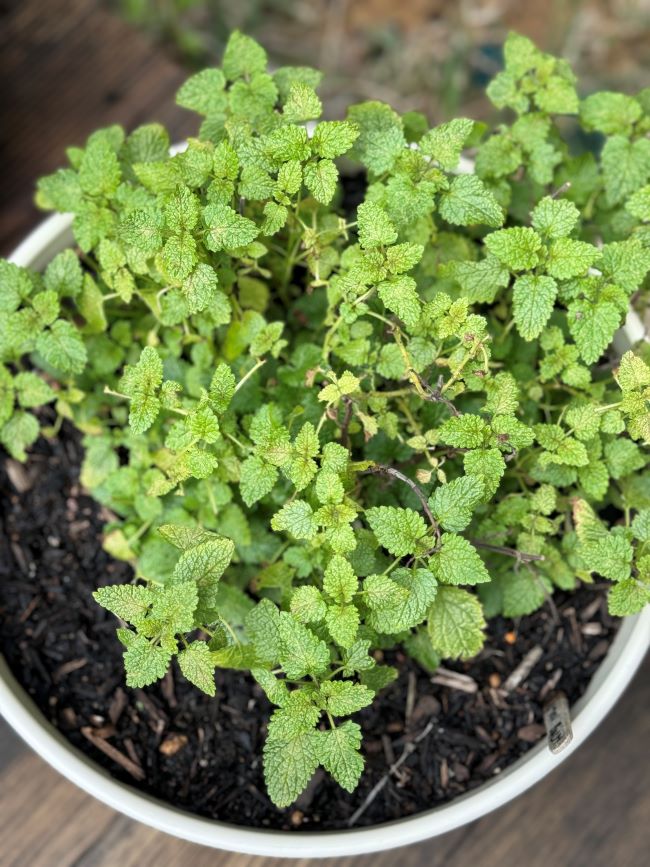Herb of the season: Melissa Officinalis

My lemon balm outside the studio
Lemon Balm soothes the nervous system and thereby lifts your spirits
I’ve chosen lemon balm for my herb of the season. We are in the middle of winter and the South West indigenous season of Makuru. This season is the coldest and wettest time of the year in our region with more frequent gales and storms. It is also known as Fertility Season. Is that because it’s a time to cosy up under the covers?
I like to choose a herb that I am able to grow because I get to have a deeper relationship with it. I am also passionate about coming back to basics and using what readily grows in our local area, which is usually the most beneficial for us. Check out its little leaves, almost heart shaped. Lemon Balm – a balm for the body, mind, heart, and soul.
Melissa officinalis is the botanical name and in Greek Melissa means bee. Bees love the flowers of lemon balm, you could say if they had a favourite then this is it. The species of this plant represented by officinalis indicates that lemon balm has a long history as a medicine. It is an old herb. In the sixteenth century, it was referred to as the elixir of life. According to the London Dispensary of 1696 lemon balm had a reputation for promoting longevity.
If you want to grow this little gem then it prefers fertile moist soil and likes to be mulched in winter when it dies back a bit. Lemon balm is related to the mint family so you might not want to let it invade your garden bed. Although I did put mine in the garden initially and didn’t find it as invasive as mint. I’m tempted to plant it in many places if the bees love it so much!
I haven’t seen my plant flower yet but then I’ve only had it for about eighteen months and the seasons have gone a bit crazy in this time. To harvest the leaves to make a fresh tea you can trim them regularly and use fresh. This will encourage the plant to become a bit fuller and bushier. To harvest a quantity of leaves for drying do this once or twice a year then let the plant recover. I like to crush the leaves a little before putting them in the teapot, inhale the heavenly scent, and enjoy your tea-making ritual on all levels of your being. This is an added benefit of growing your herbs fresh as you won’t get the same sensual delight from the dried leaves although you still get all the medicinal benefits from your tea.
As a medicinal herb lemon balm has the following properties or actions:
- calming
- sedative
- antidepressant
- diuretic
- nervine
- antimicrobial
- antiviral
- nutritive
- thyroid balancer
- emmenagogue
- tonic
- antispasmodic
- antioxidant
- fungicidal
- febrifuge
- anticonvulsant
- antibacterial
So you can see how it would aid digestion, increase mental clarity, treat nervous disorders, reduce fevers, and be an effective sleep aid. It may relieve depression, and assist with bipolar disorder. Its strong antiviral properties are especially effective for treating herpes simplex. If you feel a cold sore coming on then try rubbing a fresh leaf on your lip.
Lemon balm is a great herb for children and may assist with attention deficit disorder (ADD) as it calms but also promotes clarity in thinking.
The energy of the amazing herb is ruled by the moon and water. As well as brewing and consuming as a hot tea you can make a brew and put it out under the full moon overnight and enjoy it as a cool, cold, or iced tea on a hot day. The vitamin C in this tea can help relieve heat fatigue after a day in the sun as well as replace lost minerals from perspiration.
This is a safe tea for all ages and great for calming the nervous system in stressful situations. It is like a balm, soothing and relieving on all levels.
When we align with the laws of nature, the secrets of the universe are revealed.
Thea Summer Deer
In researching this herb I found many amazing stories of how this herb has been used to treat a huge variety of conditions and I can see why it is referred to as the elixir of life. Seems to me you could start and end the day with a cup of lemon balm and reap the many benefits. You can also use the leaves in your salads, dressings, and recipes, also using it in place of lemon peel. Crush the leaves and rub them on your skin to keep the bugs away!
I hope you feel inspired to grow lemon balm in your garden or in a pot. If not then I have a stock of organic lemon balm tea in stock ready for you to enjoy and begin to reap the benefits.
I would love to here your experiences with lemon balm so please reply or comment and let’s start connecting to these amazing herbs and allow them to enrich our lives.
Namaste
Sarah
Reference:
How can I use herbs in my daily life by Isabell Shipard
The Art and Practice of Spiritual Herbalism by Karen M Rose
Wisdom of the Plant Devas by Thea Summer Deer
Disclaimer:
None of the above is intended as medical advice. Always consult your health professional for medical assistance.


Leave a Reply
You must be logged in to post a comment.